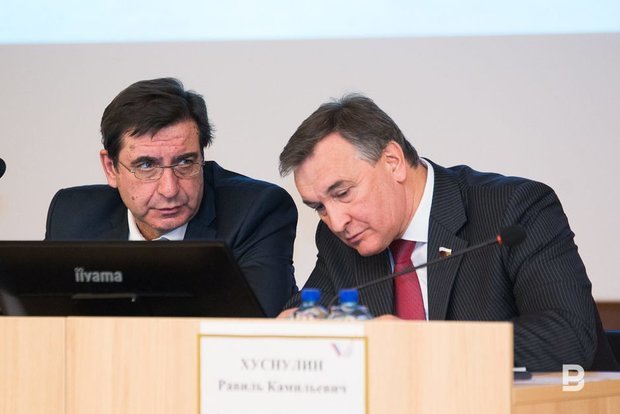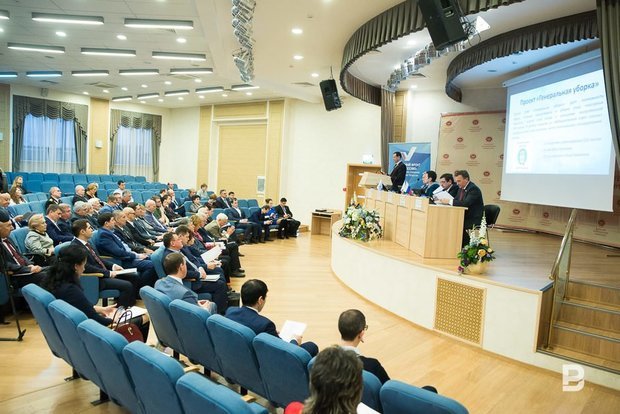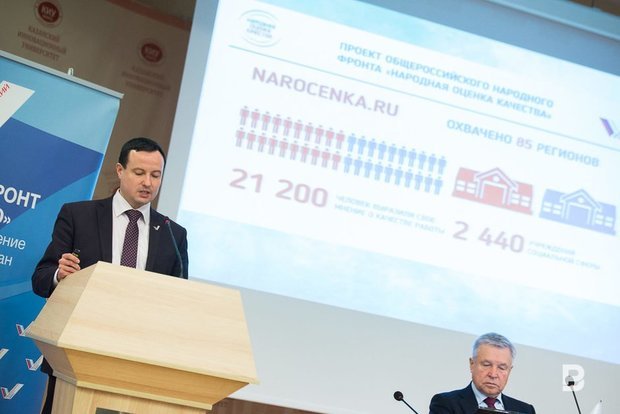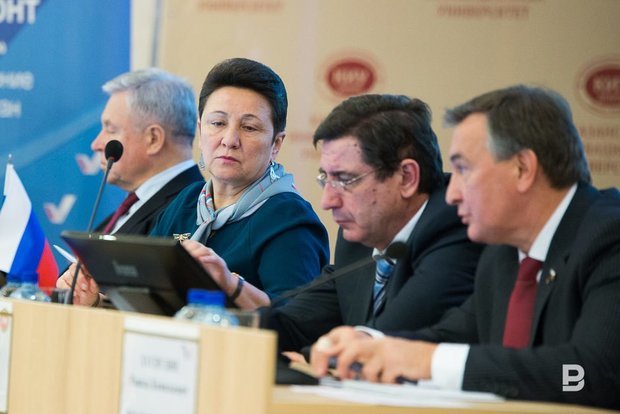How Putin’s decrees are executed in Tatarstan: from worndown roads to the Tatar language
Loopholes in the law that allow to make money on public procurements, voluntary work for the sake of accountability, and polyclinics that do not treat
The regional department of All-Russia People's Front (ONF) in Tatarstan summed up the results of their work in 2017. The ONF was conceived to control the execution of the presidential decrees of Vladimir Putin, but it is not addressing the most discussed decree — voluntary study of minority languages. As it has been revealed, the State Duma is also not addressing it, admitted the ex-chairperson of Tatarstan branch of the ONF. But all the other decrees are executed properly in the republic. However, social activists recognize that there are still some negative aspects in the form of tricks in public procurements when organizations, finding loopholes in the legislation, purchase goods at a price significantly above market one. Read the details in the material of Realnoe Vremya.
The ONF does not control Putin's decree execution on minority languages, but follows the topic
The aim of the ONF is to monitor and control the execution of decrees of President of the Russian Federation Vladimir Putin. Journalists at a meeting on results of the regional branch's work were interested in how the latest decree was being executed — the voluntary study of minority languages. As it turned out, the ONF does not monitor this issue, though recognizes that receives calls from worried citizens. Igor Bikeyev, co-chair of the ONF, decided not to designate the organization's position on this issue, but it was done by ex-chairperson of the regional headquarters, now deputy of the State Duma of Russia Ravil Khusnullin. From the Khusnullin's words it follows that only for Tatarstan it is the number one problem, but the State Duma has not even raised this issue, the deputy admitted.

The deputies discussed the 'linguistic' instruction of Putin only in private discussions, Khusnullin expressed the opinion of the associates from Dagestan, who believe that ''it is wrong to impose the study of non-native languages, but people should know the state language.'' In general, the deputy believes that the conflict that has unfolded in Tatarstan is politicized and ill-developed teaching methodology of the language lies at the root of the problem.
Volunteer unpaid work for the sake of formal reports and worndown roads
But all the other orders of Putin Tatarstan implements best of all in Russia, told Khusnullin. Tatarstan is the leader in resettlement of emergency housing, the leader in housing construction, in programmes that relate to young people, to combat illegal landfills.'' Since the start of the project Overall Cleaning, on the interactive map of the landfills there have appeared 553 objects, 406 of which were eliminated, 147 landfills remain under control.
''At the same time, there are cases that cause only surprise. In Tatarstan, the practice of organizing subbotniks, volunteer unpaid work on weekends, is widely spread, including the so-called 'ecological' ones associated with cleaning of natural objects. However, after some of such subbotniks, nobody supervises the object, even announcement papers of such events lie around everywhere like garbage. In the end, the planted trees dry out, the area turns back into a landfill again. We can conduct cleaning of one and the same place thousands times, but given such attitude there won't be any result, except for formal reporting,'' co-chairperson of the regional branch of the ONF Igor Bikeyev said.

The project that has showed effectiveness is called 'The map of worndown roads'. The ONF received 364 applications, 55 objects have been renovated, it has been conducted patch work of 18 roads.
Apples for 200 rubles and polyclinics that do not treat
One of the important projects of the ONF is called 'For fair procurments'. Within its framework, its experts monitor public procurements. The analysis of the activities revealed problems that cannot be solved at the level of the subject of the federation, it requires amendments to the federal legislation.
''It has been revealed a very dubious pricing mechanism based on the possibility to use the 223rd Federal law. One of the organizations in Kazan engaged in child nutrition held a competition for the purchase of two varieties of apples for the price of 200 rubles per kilogram. At that time the market price of apples was about 50 rubles including shipping and storage. We turned to the law enforcement agency, but it didn't reveal a violation of the law here because the law gives the organization the right to establish its own method of determining the initial maximum contract price. In other words, they write the laws for themselves by themselves,'' Bikeyev says.

In the framework of the ONG project ''People's quality assessment'', the experts checked polyclinics in Kazan and Naberezhnye Chelny. According to surveys, most often patients complain about long waiting lists to arrange a visit to specialised doctors and impossibility to do it directly, without seeing therapist.
The ONF recognises the usefulness of a large-scale programme on reconstruction of polyclinics realized by Tatarstan authorities, but understand that it is not walls who treat but doctors.
Overall cleaning of the Volga river, demolition of khrushchyovkas and suggestions for Minnikhanov
Next year, the ONF will focus on the same tasks, but there will also be new ones. In particular, the project on the Volga purification.
''Now it has been allocated a small amount — 500 million rubles, then it will be allocated about 200 billion,'' says Ravil Khusnullin.
Another problem that will be further addressed — resettlement of people from dilapidated housing.

The State Duma is discussing what to do with emergency housing in the end of their useful life, because houses deteriorate each year, for example, the same khrushchyovkas [the type of low-cost, concrete-paneled or brick three- to five-storied apartment building which was developed in the Soviet Union during the early 1960s, during the time its namesake Nikita Khrushchev directed the Soviet government]. However, a decision has not been found yet.
''Today, other regions do not have programmes such as renovation in Moscow. And when we discuss it with our associates, they say this programme should be carried out by the entire country, because khrushchyovkas are everywhere. But the problem is — if in Moscow the budget surplus was about 160 billion, in other regions there is a budget deficit, and renovation is mostly done at the expense of regional budget,'' the deputy said.
The ONF proposed Rustam Minnikhanov a number of initiatives. Among them, there are the development of a mechanism for public-private partnership to restore abandoned children camps, they are 20 in Tatarstan; providing free meals in schools for families with three children; reimbursement of costs for creating accessible environment to employers who employ people with disabilities.